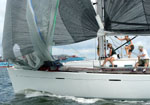Boaters raise $179,000 for patient
care
by Mary Helen Yarborough
Public Relations
As MUSC’s Hollings Cancer Center takes major steps to finding cures for cancer, area boaters are helping to underwrite important blood cancer research and patient care through money they have helped raise during the past 11 years.
 Lacy Terwilliger
(standing) hoists the spinnaker on her boat “Dauntless,” a Beneteau
First 47.7 racing cruiser, during the annual Leukemia Cup Regatta. She
and her 14-member crew won first place in the A-fleet class.
Lacy Terwilliger
(standing) hoists the spinnaker on her boat “Dauntless,” a Beneteau
First 47.7 racing cruiser, during the annual Leukemia Cup Regatta. She
and her 14-member crew won first place in the A-fleet class.The 11th Annual Leukemia Cup Regatta in Charleston on Sept. 22 raised $179,000 by competitors and their sponsors. This brings the total amount the local regatta has raised since 1996 to almost $1.1 million.
Hosted by the Charleston Ocean Racing Association in the Charleston Harbor, the regatta relies upon a loyal MUSC presence whose employees and patients help organize and recruit volunteers, and put on an auction in the two-day event that has become one of the area’s most successful fundraisers.
This year, regatta organizers included Priscilla Parker, administrator for Business Development and Marketing Services; Sarah Ashton of Neurosciences; Jane Beasley, an administrator in Support Services; and Lacy Terwilliger, a radiation dosimetrist in MUSC’s Radiation Oncology Department.
A four-time Hodgkins Disease survivor, Terwilliger also is a tireless supporter for the regatta and other events that support cancer research from which she personally has benefited. For her efforts this year, she was presented the Attawy/Fedele Spirit Award for her contributions to this year’s cup.
“MUSC employees’ support and participation in the event are significant,” Parker said. “Patients and research at MUSC also have benefited from the dedicated sailing community and the generosity of the people in this area.”
Sixty-four competitors, including 47 large sail boats and 17 small boats, raced to support the Leukemia and Lymphoma Society (LLS) that has funded a number of research projects at MUSC. LLS is the world’s largest voluntary health organization dedicated to funding blood cancer research, education and patient services. Its mission is to cure leukemia, lymphoma, Hodgkin’s disease and myeloma, and improve the quality of life of patients and their families. Since its founding in 1949, LLS has invested more than $550.8 million for research specifically targeting blood cancers.
LLS’ awards include a current three-year $600,000 grant to HCC for leukemia research led by Daniel Fernandes, Ph.D.
Fernandes and an MUSC team of researchers helped develop a drug that attacks the cancer cells in acute myeloid leukemia (AML). AML is the deadliest, most difficult-to-treat form of leukemia. MUSC is the lead investigating institution, which also is working with Stanford University and M.D. Anderson Cancer Center.
“At MUSC, we identified a critical protein that promotes the survival of the leukemia cells and then demonstrated that a new anticancer drug targets this protein,” Fernandes said. “We then showed the drug is active in leukemia.”
The drug was synthesized by Antisoma Ltd., a London-based pharmaceutical company that specializes in novel drugs to treat cancer, and currently is in the early stages of human trials.
The therapy has been tested on three patients at HCC so far, and ultimately will be tested on 60 patients in the United States, Fernandes said.
Across S.C. to MUSC
This year, an estimated 1,600 South Carolinians and 126,000 people in the United States will be diagnosed with some form of blood cancer, according to Paul Jeter, executive director of the LLS in South Carolina.
Many of these people have limited resources, and even those with insurance have hefty deductibles and other uncovered expenses. Fundraisers, such as the regatta and other activities, are critical to providing funds needed to support patients and blood cancer research.
Last year, the LLS chapter in South Carolina spent $120,000 on patient aid, Jeter said. “This money helps pay expenses for patients who have to travel to medical facilities for testing and treatment of blood cancer,” Jeter said.
While other medical facilities in the state provide services to blood cancer patients, “probably a majority of them will go to MUSC for treatment,” Jeter said.
LLS holds several key fundraisers each year in South Carolina, including the regatta in Charleston, the annual Leukemia Ball in February and the Light the Night Walk event in October.
On the night of Oct. 11, a team of walkers from MUSC will join hundreds of others expected to participate in the Light the Night Walk at the Charleston Maritime Center. About 500 people participated in the Charleston event last year, which raised about $65,000.
MUSC’s team, “Lab to Bedside,” is being headed by Kay Fernandes, research specialist in MUSC’s Alcohol Research Center, and wife of the aforementioned HCC researcher. Fernandes currently is recruiting sponsors and walkers.
The walk correlates with other walks held around the state and country to honor the lives of people touched by blood cancer. Walkers will hold illuminated balloons, white for survivors and red for supporters, “to light the night with hope.”
Music, food and information will be provided before the walk.
For more information, or to register, go to
http://www.lightthenight.org/sc.
Friday, Oct. 5, 2007
Catalyst Online is published weekly,
updated
as needed and improved from time to time by the MUSC Office of Public
Relations
for the faculty, employees and students of the Medical University of
South
Carolina. Catalyst Online editor, Kim Draughn, can be reached at
792-4107
or by email, catalyst@musc.edu. Editorial copy can be submitted to
Catalyst
Online and to The Catalyst in print by fax, 792-6723, or by email to
catalyst@musc.edu. To place an ad in The Catalyst hardcopy, call Island
Publications at 849-1778, ext. 201.